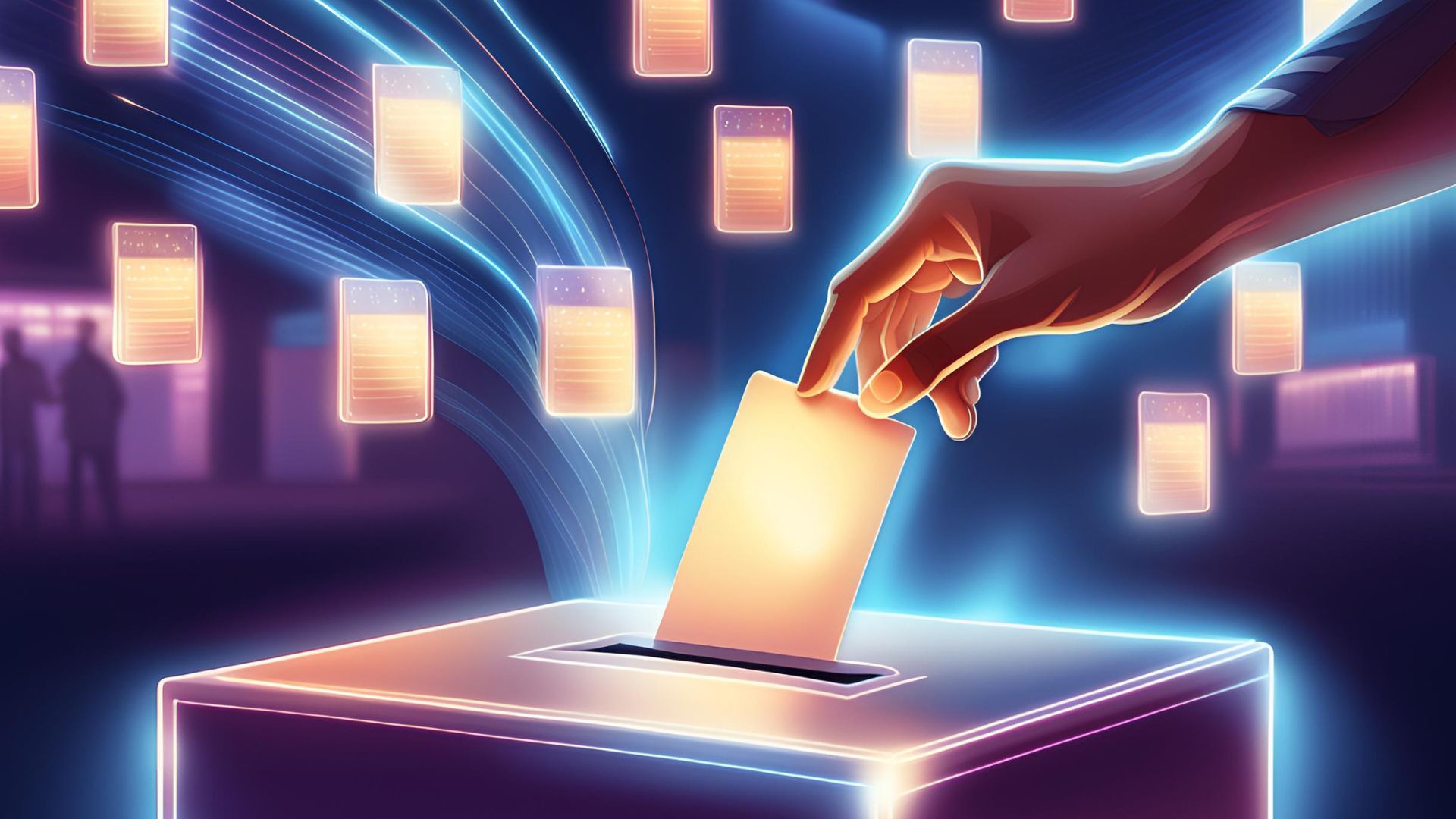Election season is a familiar time for many of us, bringing the usual questions: How secure is my vote? Will the results be transparent and accurate? As elections—from student councils to national governments—face growing scrutiny around security and reliability, blockchain technology stands out as a powerful, forward-thinking solution.
Let’s explore how GalaChain could transform election management systems to make voting safer, more transparent and more efficient for everyone involved.
We’re not suggesting that GalaChain has a project in the works that will specifically address the problems and solutions presented in this article. Rather, these ideas should encourage our community of readers to think outside the ballot box (so to speak), to begin imagining the ways that GalaChain could solve these problems with community-developed projects in the not-so-distant future.
Why Blockchain in Elections?
In democratic countries, localities and organizations throughout the world, voting is considered an essential duty that gives everyone a voice in important decisions. When it comes to voting, security and transparency are paramount. But as we pioneer into an increasingly digital future, more traditional systems are vulnerable to security threats, human error and inefficiencies.
Blockchain tech offers a unique and potentially tamper-proof approach that would build trust into the process at every stage, increasing voter participation and election accuracy.
Imagine voting from your phone or computer with full confidence that your vote will be recorded accurately and instantly. Imagine knowing that the results are verified by a network of independent observers without compromising privacy. With blockchain, these possibilities are closer than ever.
How GalaChain Could Enhance the Voting Experience
In many ways, governments operate like large businesses, consisting of complex systems with multiple departments and numerous individuals working toward ever-evolving goals. As technology advances, businesses are expected to keep up or fall behind. Basically, if a leading company doesn’t use the most streamlined tools, they may be overtaken by a competitor making better use of its time and resources. No one wants to go the way of a video rental store in a streaming world.
Administrative systems for government programs are no exception; if they do not continually update and upgrade to some degree as new and better systems become available, they could be setting their people up for a disadvantage.
Immutable and Transparent Vote Recording
Think of blockchain as a digital ledger that permanently records every transaction, or in this case, every vote. Once you cast a ballot on the blockchain, it’s recorded forever, and there’s no way for anyone to alter, delete or manipulate it.
Transparent Yet Private: Every vote cast on the blockchain is visible in a public ledger, ensuring transparency while maintaining anonymity. This means anyone can verify that votes are recorded accurately without seeing who cast them.
Trust Built Into Every Vote: With blockchain, there’s no room for miscounting or tampering. Your vote could be set in digital stone the moment it’s cast. The result? A process that the public can trust, down to each vote.
This transparency makes blockchain ideal for election integrity, whether it’s a local school board or a national government vote. Everyone gets an equal, unalterable say, with the option for real-time viewing, so there’s no need to wait for official counts.
Decentralized Verification of Results
In traditional systems, results are often verified by a single central authority. With its decentralized nature, blockchain could change this, allows every member of the network to participate in verifying the vote count.
No Single Point of Failure: A blockchain such as GalaChain would enable a distributed network of nodes (independent participants) to verify every vote, reducing the risks associated with centralization and making hacking incredibly difficult.
Network of Trusted Observers: With multiple independent nodes verifying votes, the final result is one that no single individual or party can manipulate. Each node validates the results, providing a level of security and consensus rarely seen in traditional systems.
Imagine setting up a network of independent observers who confirm the vote count collectively in the same way crypto transactions are validated. This eliminates the need for a central authority, replacing it with the decentralized consensus model that makes blockchain so secure.
Blockchain-Based Voter Identity Verification
One of the most challenging issues in modern elections is verifying voter identities securely without risking privacy. Blockchain-based digital IDs would potentially solve this problem as well, allowing voters to confirm their eligibility without revealing sensitive information.
Secure, Confidential Verification: Blockchain allows for secure, encrypted identity verification. Each voter could have a unique digital ID stored on the blockchain, making it simple to verify eligibility without needing extensive paperwork or risking identity theft.
No Duplicate Votes: With blockchain, there’s no risk of voting multiple times. Smart contracts enforce one vote per verified identity, removing the risk of duplicate or fraudulent votes.
By securing voter identity verification on blockchain, elections would be upgraded in both accuracy and efficiency. Think about the countless hours and resources saved by moving from physical to digital verification—resources that could go back into improving our communities.
Smart Contracts for Streamlined Vote Processing
Smart contracts are pieces of code on the blockchain that automatically execute actions when certain conditions are met. For elections, this could mean secure, automatic vote counting.
Automatic, Accurate Counting: Smart contracts can handle the entire vote-counting process, eliminating human error and speeding up results. As each vote is cast, it’s recorded, counted and secured automatically.
Custom Election Rules: Let’s say you want to limit votes to registered members of a certain organization. Smart contracts can enforce these rules automatically, ensuring only those eligible to vote can participate.
With smart contracts, the voting process could be streamlined to improve accuracy and reduce the time between voting and results. Imagine election night with real-time, automatic counting that’s transparent and secure.
Accessibility for Remote Voting
A system like GalaChain could significantly reduce geographic and logistical barriers when people are unable to show up at the polling place. Imagine the convenience of voting from your phone or computer without compromising on security or integrity.
Vote from Anywhere: Blockchain technology would enable secure remote voting, ideal for students studying abroad, employees on work assignments, or people with disabilities. No more absentee ballots lost in transit or inaccessible polling stations.
Instant Verification and Counting: Votes can be counted and verified immediately, without the need for physical handling or mailing. This is especially useful for larger elections where delays are common and results slow to emerge. In some elections, streamlining this aspect means saving millions of volunteer hours and millions of dollars.
From corporate board elections to city councils, remote blockchain voting can offer secure and accessible options, allowing more people to participate in the democratic process. Just like web3, effective democracy is made possible by participation and trust in the system.
Auditable Election Trail
One of the greatest strengths of blockchain technology is its auditability. Blockchain would create a comprehensive record of every step in the election process, making it easier to detect and prevent fraud.
Complete Audit Trail: Every action, from casting a vote to verifying results, would be recorded. Election authorities and auditors would have the ability to review this trail without altering it, confirming that each vote was counted and recorded accurately.
Data-Driven Insights: Blockchain data can reveal insights into voter turnout, voting trends and demographic information, all while preserving voter anonymity. Such data collection could then be used to enhance the integrity of future elections and build upon the progress that has already been made.
Auditing isn’t only for large-scale elections; even local councils and student governments could benefit from an auditable, secure record to ensure their members have confidence in the process.
Blockchain Consensus: Preventing Fraud with Distributed Verification
The consensus mechanisms behind blockchain make it highly secure. GalaChain could be utilized to leverage these mechanisms to ensure that votes are recorded accurately.
Multi-Node Verification: By verifying each vote across a distributed network of nodes, blockchain virtually removes the risk of centralized manipulation. The network validates itself, eliminating bias and providing unbiased results.
Automatic Fraud Detection: Blockchain can flag unusual voting patterns, like rapid repeat votes, by relying on its self-regulating structure. The system can automatically reject or review suspicious votes, making fraud nearly impossible.
For large organizations or national elections, the distributed nature of blockchain is critical for ensuring that each vote counts equally and that the final results are fair and free from tampering.
Real-World Applications for Blockchain Voting Systems
Let’s take a closer look at how blockchain capabilities could apply to a range of voting needs:
Student Council and Local Elections: Schools and small organizations can use blockchain to reduce costs and improve transparency in student council or HOA elections. This could help young voters get familiar with secure, digital voting from an early age.
Corporate Board Votes and Shareholder Meetings: For corporate settings, blockchain could enable secure proxy voting, protecting shareholder interests by making voting more accessible and trustworthy.
Municipal and Governmental Elections: For larger communities or even entire nations, blockchain can provide a trustworthy, scalable infrastructure for secure voting, from mayoral elections to national referendums.
Envisioning a Transparent and Trusted Future with GalaChain
Governance and democratization are already core components of web3, paving the way for a harmonious upgrade to democratic processes throughout the world.
Blockchain brings a world of new possibilities to voting. By providing secure identity verification, transparent vote recording and real-time processing, blockchain could transform our approach to elections. GalaChain is already making decentralized ownership possible in gaming, music, and more, and it’s easy to imagine how it could lend its scalable and secure strength to elections.
In the future, secure, transparent and accessible elections could become the norm across the world—supported by the blockchain technology at the heart of GalaChain’s mission. Whether for a high school class president or a state government election, blockchain offers solutions that are modern, effective and ready for real-world adoption.
Who’s ready to bring voting into the future with blockchain?
Learn more about building on GalaChain


